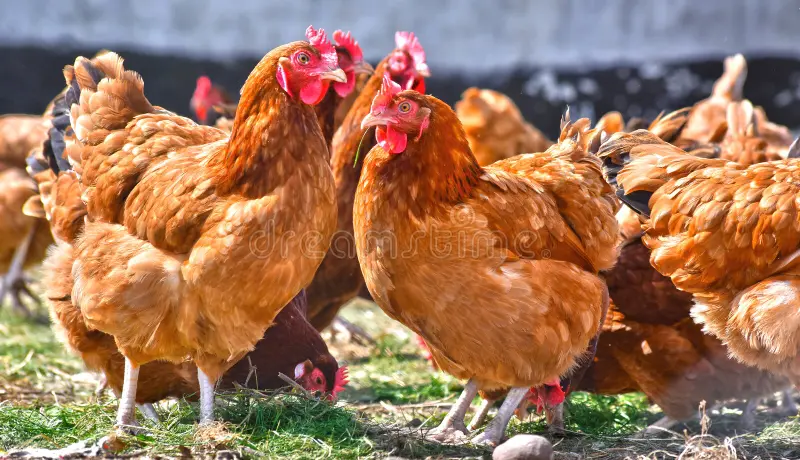Nigerian poultry farmers are currently facing significant challenges, grappling with the twin issues of reduced demand for eggs and the ongoing heat wave that is exacerbating their losses. Many of these farmers, particularly in states like Plateau, Niger, and Abuja, are dealing with the added burden of high temperatures that are affecting egg production, while the purchasing power of consumers continues to dwindle due to the country’s economic difficulties.
A major concern for the farmers is the lack of proper cold chain storage, which is making it difficult to preserve eggs for long periods in the extreme heat. Without cold storage facilities, eggs are often left to spoil, forcing farmers to sell at prices lower than their production costs just to avoid a complete loss. In Abuja, for instance, a crate of eggs is priced between N5,000 and N6,500, but with demand considerably lower due to inflation and reduced consumer purchasing power, many stores are left with unsold stock.
Two weeks ago, in Jos, one of the main egg production centers in northern Nigeria, prices dropped to between N3,900 and N4,000, though they have slightly increased to between N4,200 and N4,300 this week. Despite the price reductions, farmers are struggling with a severe lack of demand, and eggs are accumulating in large quantities as consumers refrain from buying.
Muhammad Bello Ibrahim, a poultry farmer, expressed his frustration on social media, highlighting the dire situation for egg producers. “Those in the egg business are currently facing low patronage despite lower prices. The eggs are piling up in a period of very hot weather. In the past, some states were encouraged to buy eggs for school feeding, hospitals, and even correctional centers. That was pleasing to farmers across the country. But now, things are different. Every farmer is left alone. The losses are building up,” Ibrahim said.
In Plateau State, a region known for its relatively cooler climate, poultry farmers are facing even greater challenges. Nanji Gambo-Oke, a poultry farmer and former Public Relations Officer of the Poultry Farmers Association in the state, revealed that egg production has reached a crisis point. “Plateau residents are not significant consumers of eggs, and so, 80% of the eggs produced here are sold to neighboring states, including Abuja,” she said. This reliance on external markets has left farmers vulnerable to fluctuations in demand and price, especially with the severe heat affecting production.
Gambo-Oke also noted that many farmers in Plateau are small-scale producers with limited resources and knowledge, which leaves them open to exploitation by middlemen. These middlemen often offer low prices, putting additional financial pressure on farmers. Moreover, she highlighted that egg production is often viewed as a side business for many in Plateau, further limiting their capacity to cope with market fluctuations and production challenges.
The heat wave this year has been particularly harsh, and Gambo-Oke explained that farmers were unprepared for such extreme conditions. “In my years of farming in Plateau, I haven’t experienced such heat, and the consequences are enormous. There has been low production, an increase in peewee eggs, and higher mortality rates,” she said. Farmers are now relying on what she referred to as “spiritual resilience” to persevere through these trying times. Unfortunately, the state has not benefited from government-sponsored school feeding programs, which could have offered some relief. Furthermore, the response from the Plateau State government has been slow, further exacerbating the crisis.
Mrs. Shinkur Angela Jima, the chairperson of the Poultry Farmers Association in Plateau, emphasized the urgent need for government intervention. While she acknowledged the state’s commitment to the poultry sector, she expressed concern over the persistent challenges that include rising feed prices, increased costs for poultry drugs, and the impact of middlemen on the industry. Jima also pointed to the weather conditions as a significant factor, noting how the current heat has drastically reduced egg production.
In Niger State, poultry farmers are also grappling with the combined challenges of high temperatures and a decline in demand. The absence of adequate storage facilities has led to widespread spoilage of eggs, with farmers suffering significant losses. Khadijah Adamu Ndanusa, the manager of Al-Amman Farms, shared that she has resorted to supplying eggs on credit to local tea sellers. “It sells faster with them, but they don’t joke with my money. If they do, it’s at their own peril, as they don’t have enough capital to sustain their business,” she explained.
Mohammed Suleiman, another farmer in Niger State, described how he had to sell off all his layers due to the high losses during the heat period. “During the heat, losses are usually too high. Apart from the drops in egg laying, many of the birds die. If you were getting five crates of eggs in normal weather, that number drops to three during the heat,” he said. Suleiman further lamented the situation in Niger, where erratic power supply has worsened the plight of farmers, making it even more difficult to manage the heat and preserve their eggs.
The former Public Relations Officer of the Poultry Farmers Association in Niger State, Usman Danladi Mohammad, reported that farmers in the region are losing over 20 crates of eggs weekly due to low patronage and inadequate storage facilities. The combination of these factors has put farmers in a dire financial situation, leading some to abandon their businesses entirely.
Overall, the poultry sector in Nigeria is facing one of its most challenging periods, with farmers enduring financial strain from reduced egg sales, spoilage due to heat, and a lack of governmental support. The ongoing heat wave, coupled with economic difficulties and a decrease in egg consumption, has put the livelihoods of poultry farmers at risk. There is an urgent need for policy interventions and support mechanisms to help the sector weather this crisis.







